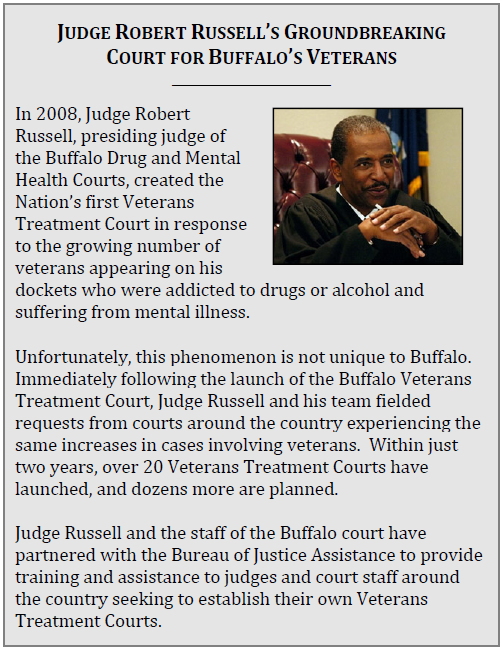Veterans Treatment Courts
As Americans, we must keep in mind the enduring debt we owe our country’s military veterans. While news accounts remind us daily of the dangers our military men and women confront in combat, the serious challenges facing our veterans when they return home, particularly substance abuse and psychological health problems, often go untreated. Sadly, these challenges can sometimes lead to criminal or other destructive behaviors. The Justice Department’s most recent survey of prison inmates found that an estimated 60% of the 140,000 veterans in Federal and State prisons were struggling with a substance use disorder, while approximately 25% reported being under the influence of drugs at the time of their offense. Many of these issues can be connected to the trauma of combat and other service‐related experiences and, for this reason, require appropriate measures to address them. Veterans Treatment Courts are designed to do just that, by meeting the particular needs of veterans involved in the criminal justice system.
military men and women confront in combat, the serious challenges facing our veterans when they return home, particularly substance abuse and psychological health problems, often go untreated. Sadly, these challenges can sometimes lead to criminal or other destructive behaviors. The Justice Department’s most recent survey of prison inmates found that an estimated 60% of the 140,000 veterans in Federal and State prisons were struggling with a substance use disorder, while approximately 25% reported being under the influence of drugs at the time of their offense. Many of these issues can be connected to the trauma of combat and other service‐related experiences and, for this reason, require appropriate measures to address them. Veterans Treatment Courts are designed to do just that, by meeting the particular needs of veterans involved in the criminal justice system.
Veterans Treatment Courts seek to treat veterans suffering from a substance abuse and/or mental health disorder, while helping ensure public safety. These special courts combine rigorous treatment and personal accountability, with the goal of breaking the cycle of drug use and criminal behavior.
Veterans Treatment Courts are modeled after drug courts, which promote collaboration among the judiciary, community corrections agencies, drug treatment providers, and other community support groups. Drug courts have a remarkable track record over the course of their 20‐year history. During times of difficult economic conditions for State and local governments, drug courts still prove to be a smart, cost‐effective investment that helps put offenders on the road to recovery, effectively reducing recidivism.
Veterans Courts promote sobriety, recovery, and stability through a coordinated response involving the traditional partners found in drug courts and mental health courts, as well as the Department of Veterans Affairs healthcare networks, the Veterans Benefits Administration, State Departments of Veterans Affairs, volunteer veteran mentors, and veterans family support organizations.
Veterans Treatment Court Planning Initiative (VTCPI) – Building on Success
In an effort to replicate the success of the first Veterans Courts, an initiative has been launched to help more communities establish Veterans Courts. The 2010 Veterans Treatment Court Planning Initiative (VTCPI) constitutes the first Veterans Treatment Court training program in the Nation. The VTCPI curriculum is a collaborative effort of the Bureau of Justice Assistance (BJA), the Department of Veterans Affairs, the National Drug Court Institute (NDCI), and numerous Veterans Treatment Court professionals.
Ten jurisdictions have been awarded VTCPI grants. The communities selected are in Orlando, Florida; Cincinnati, Ohio; Augusta, Georgia; San Antonio, Texas; Eau Claire, Wisconsin; Kew Gardens, New York; Klamath Falls, Oregon; Elmira, New York; Batavia, New York; and San Diego, California. The grant awards were based on a variety of factors, including the size of, and problems among, the applicants’ respective veteran populations.
Legislative Efforts
State legislatures: A number of states have taken steps to promote Veterans Treatment Courts or veterans assistance within the state court system:
- Nevada and Texas have passed legislation calling for the statewide establishment of Veterans Treatment Courts. Similar legislation has been introduced in Colorado, Illinois, and at least nine other states.
- California, Minnesota, and New Hampshire have passed legislation that permits judges to order treatment, instead of prison, for veterans suffering from combat‐related mental health disorders.
Download PDF
